English Words in Action, Group M
(a variety of English words which have developed through history and are currently used in our modern age)
Simply click on this banner (or the following link) and you will be on your way to stimulate your brain for greater word comprehension with quizzes based on some of the words in this unit.
2. Etymology: from Middle English maddock, magotte, mathek, "grub, worm, maggot".
From ancient times until the introduction of antibiotics, physicians used maggots to help clean injuries and prevent infections.
Because the maggots feed solely on dead flesh, doctors did not have to worry about them eating healthy tissue.
The arrival of antibiotics replaced medical maggots; then when widespread resistance to antibiotics evolved, there was a new interest in the use of medical maggots.
Maggot therapy may sound medieval, but modern medicine seems to guarantee that it works even now in our modern age.
Originally, in law, it was a crime if people maimed others to make them less able to defend themselves.
2. Etymology: to cripple, to disable, to mutilate; from Middle English, maymen, mahaymen; from Old French, mehagnier, mahaignier, mayner; which is of Teutonic origin.
Go to this Word A Day Revisited Index
so you can see more of Mickey Bach's cartoons.
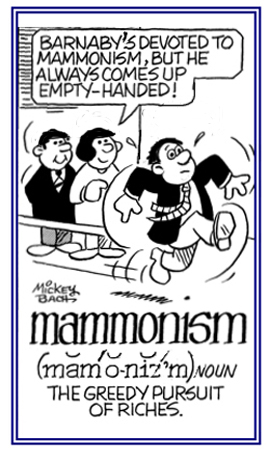
Go to this Word A Day Revisited Index
so you can see more of Mickey Bach's cartoons.
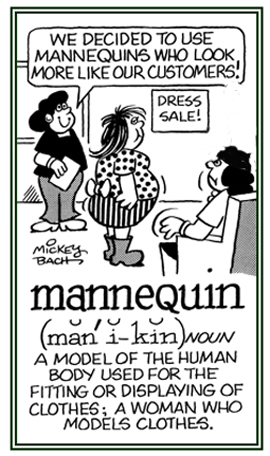
Go to this Word A Day Revisited Index
so you can see more of Mickey Bach's cartoons.
2. A slogan or a statement that is repeated often: Carol's current mantra is to work s-l-o-w-l-y.
Some people in businesses use the mantra, "Bigger is better"; however, it isn't necessarily true.
The use of the mantra sounds of om mani padme hum is an aspect of Tibetan Buddhism.
3. Etymology: from the 18th century; Sanskrit, literally, "an instrument of thought" from man, "think".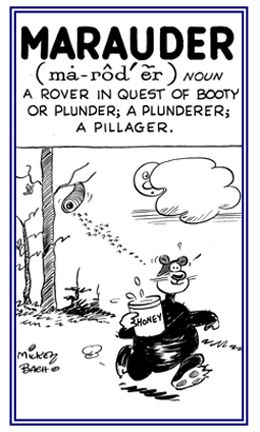
Go to this Word A Day Revisited Index
so you can see more of Mickey Bach's cartoons.
There are soil experts who believe that marl is a valuable fertilizing material for various kinds of soils depending on their compositions.
2. Associated with the military or armed forces: The country maintains a martial or warlike attitude toward its neighbors.
3. Soldier-like in behavior, bearing, etc.: The old veteran had a martial attitude.
Mr. Brown's martial uniform makes him look older than he really is.
4. Etymology: Martial literally means "pertaining to Mars", the Roman god of war.Martial may refer to anything related to a soldier, like a military uniform, or it can refer to someone who is antagonistic and warlike.
If Martial Law is declared in a country, it means that the military has taken control of that country.
Martial Arts refers to any of several fighting styles that include specified methods of training for combat, armed and unarmed; and it is performed as a sport, including boxing, karate, judo, etc.
2. A person who lays stress on a strict adherence to the technicalities of rules and forms and of set methods: The teacher, Mrs. Hinds, was quite a martinet because she only accepted homework which was handwritten in blue ink and in notebooks of a certain size with lined pages.
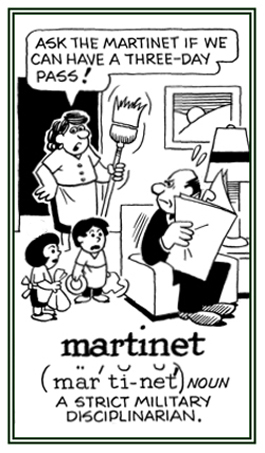
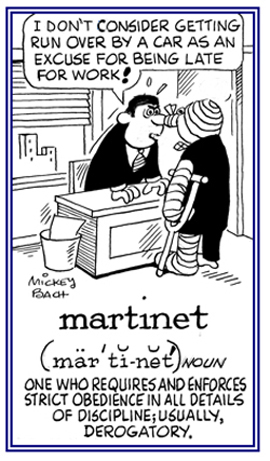
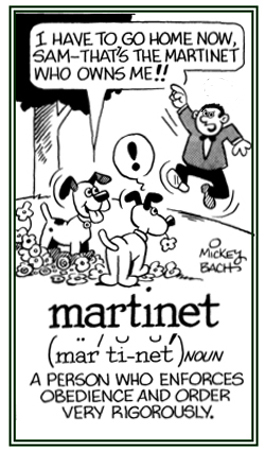
Go to this Word A Day Revisited Index
so you can see more of Mickey Bach's cartoons.
2. A reference something which is large or imposing, as in quantity, scope, degree, intensity, or scale: The military unit must be reinforced by the further deterrent of massive retaliatory power.
3. Relating to something which is considerably large in comparison with the usual amount: The doctor gave Sharon a massive dose of medication as a painkiller for the injury she suffered when she fell on the slippery steps.
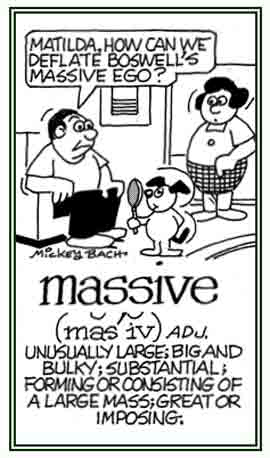
Go to this Word A Day Revisited Index
so you can see more of Mickey Bach's cartoons.
Links to all of the groups of English words in action, Groups A to Z.
You may see the bibliographic list of sources of information for these words in action.


